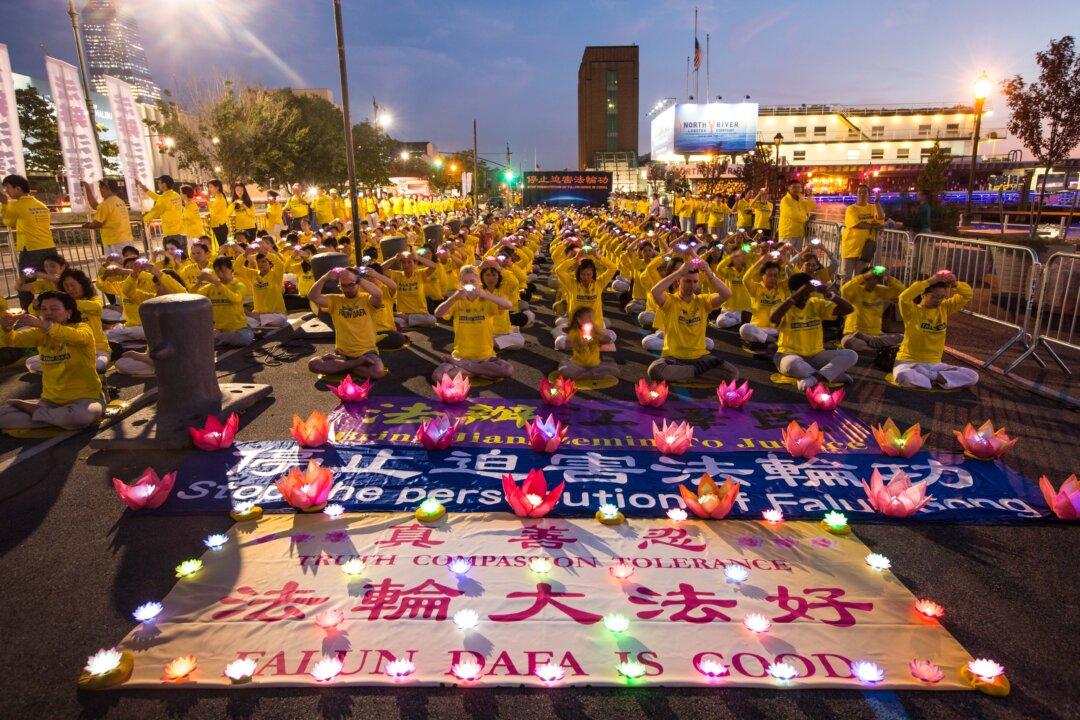NEW YORK—In the spring of 1999, oil painter Ge Zhigang had just graduated from his university in the northeastern Chinese city of Changchun. His wife had completed her degree a year before him and was employed as an instructor at the campus.
The couple were also practitioners of Falun Gong, the traditional meditation discipline that would soon be subjected to the largest and most brutal suppression of human rights in modern Chinese history. Ge and his wife were forced out of work, thrown into labor camps, and forced into homelessness.
Condemning 17 years of persecution at the hands of China’s communist regime since July 20, 1999, Ge and scores of other survivors joined hundreds of Falun Gong practitioners to participate in a vigil held before the Chinese Consulate in New York City.
“I feel quite moved,” said Ge, who emigrated with his wife and daughter in May. “We should show the Chinese people that Falun Gong is accepted and legal worldwide, and to encourage our fellow practitioners in China by showing that people around the world stand by them.”

Falun Gong was first taught to the public in Ge’s hometown, the industrial city of Changchun, in 1992. By the time Ge took up the practice in 1996, it had grown beyond its northeastern Chinese cradle to the rest of the country and had tens of millions of adherents. By 1999, China’s State Sports Administration estimated that 70 million people were practicing Falun Gong.
But while the combination of qigong exercises with self-improvement based on traditional moral principles had wide appeal, not everyone was so welcoming.
Falun Gong came under increasing pressure from hardline figures in the Communist Party, and eventually, then-general secretary Jiang Zemin gave the order to eliminate it. An entire extralegal organization was created to oversee and implement the persecution at all levels of the government apparatus.
A Grave Injustice

For millions of people around China, the sudden attack on their faith was so bizarre that they felt it must have been a massive misunderstanding: Falun Gong had no political agenda and its teachings revolved around three Chinese characters meaning truthfulness, compassion, and tolerance. Before 1999, the media, statesmen, and government agencies, including the Ministry of State Security, had praised the practice for its social and health benefits.
To counter the round-the-clock propaganda—articles slandering the practice as “superstitious” or printing quotes from its teacher Li Hongzhi spliced to suggest extreme beliefs, to give a couple of examples—practitioners in the early days of the persecution traveled to Beijing to appeal for an end to the ban.
“This wasn’t fair,” said Qing Yu, a practitioner in her 40s from the northeastern province of Liaoning. “This was how everybody in our area felt.”
These gestures were met with mass arrests, torture, and brainwashing—the regime’s preferred ideological solution for practitioners who refused to give up their faith.
Qing Yu, who emigrated in 2014 and spoke at the vigil using a pseudonym, said she had been arrested in 2001 and 2003. She and some other practitioners had been coerced into signing “statements of regret” in exchange for their freedom.
The extremely opaque nature of the Chinese regime makes quantifying the full scale of the persecution a matter of great difficulty. Aside from sentences in prisons, labor camps, and brainwashing centers, there are also thousands of documented deaths in police custody, and the number of practitioners murdered for their organs may exceed one million.

Broken Families
Zhang Hongyu, from the city of Dandong on the Sino–Korean border, first learned Falun Gong at the age of 11 in 1998, when much of her family took up the practice. They were among thousands of practitioners in this relatively minor Chinese city.
Speaking calmly but rapidly as she held a banner outside the Chinese Consulate, Zhang described the tragedies the persecution had visited upon her family. Her father, a court worker, had received daily pressure to prevent his wife from practicing Falun Gong or spreading information about it.
When it was discovered that he too practiced, he was fired. Zhang’s mother was arrested several times around the time of the 2008 Olympics, and was sent to a labor camp.
Having suffered abuse in detention, her mother’s health deteriorated and she died in 2013.
This sudden blow affected Zhang deeply. She had overcome the economic and social difficulties imposed by the persecution and was able to graduate and hold a job. But with her mother’s passing, she knew it could only be a gilded cage.
“The Communist Party will never change its ways,” she said, referring to the endless cycle of communist political campaigns that have buried tens of millions of Chinese since the founding of the People’s Republic.
“In the mainland, there is no way to speak out without being locked up. I left the country with the hope of showing the facts to the people of the world and for the sake of my deceased mother. The truth can’t be buried forever.”




